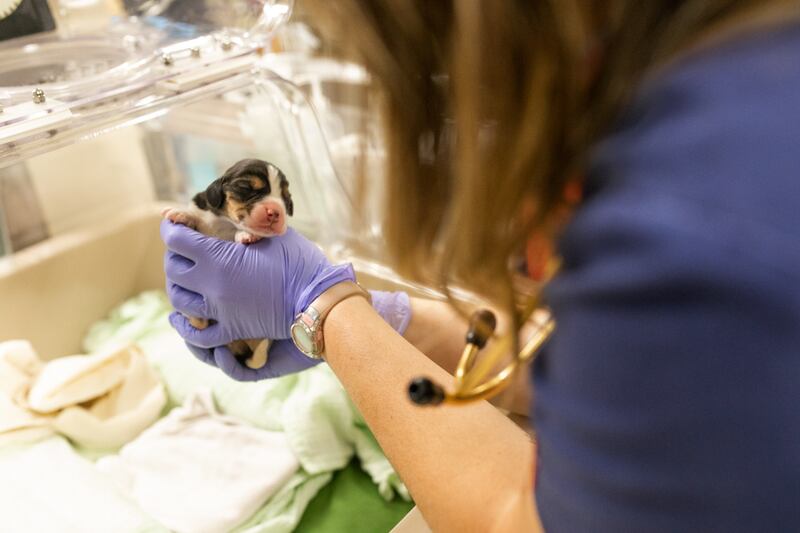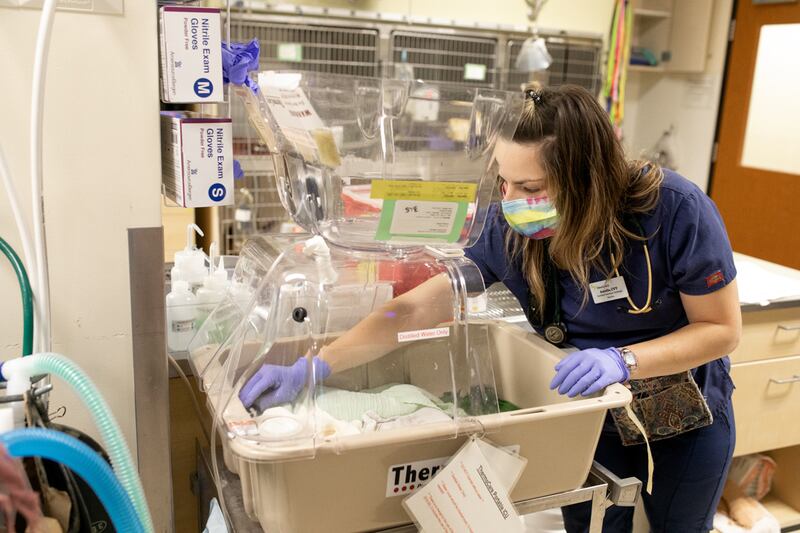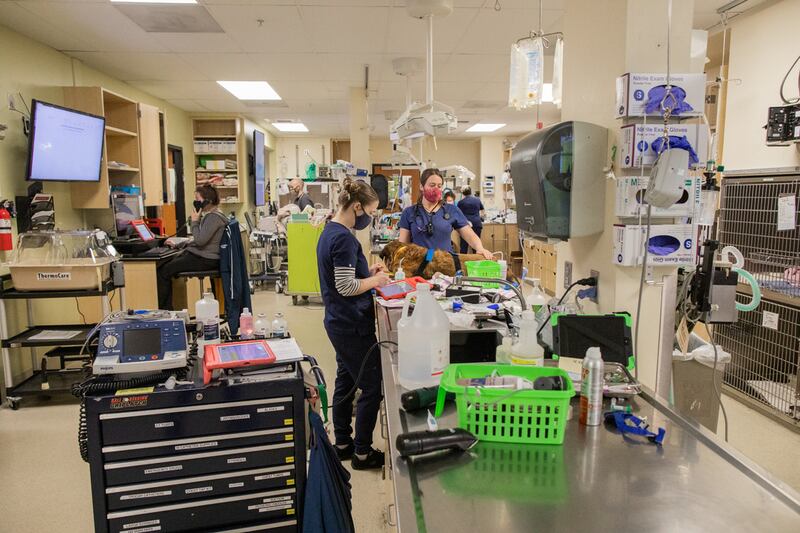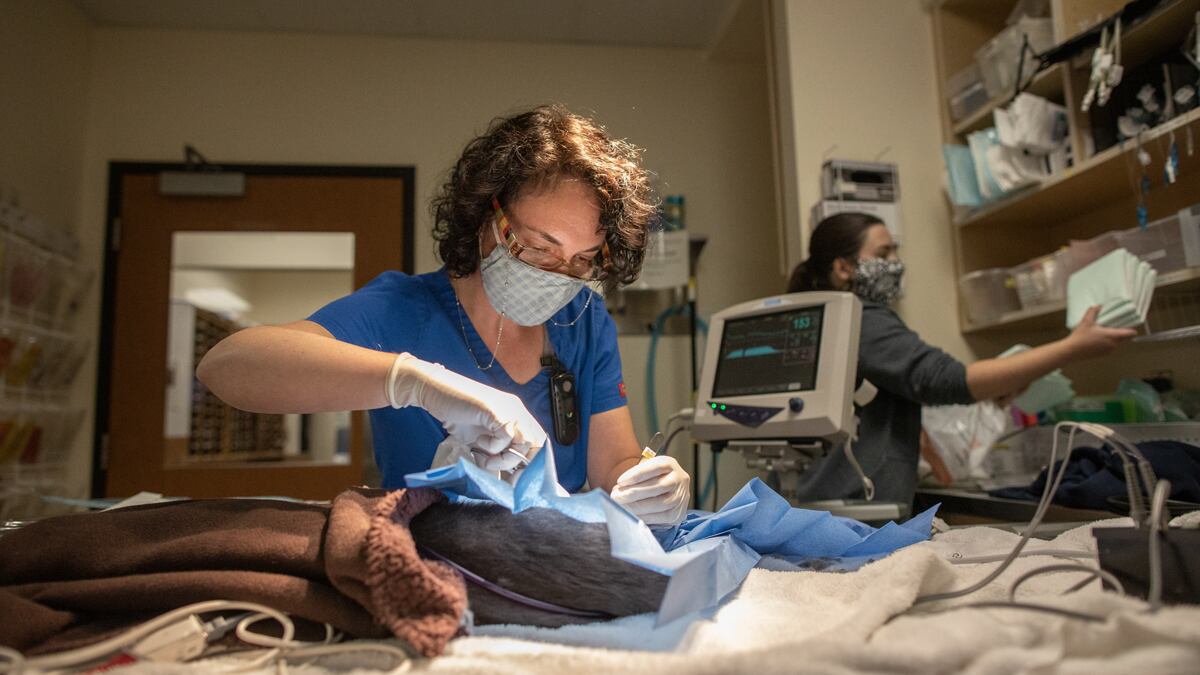It was a typically busy Sunday on the emergency room floor of DoveLewis.
Two veterinary technicians were stabilizing a fluffy white cat who arrived with a urinary tract infection. A mixed-breed dog left a puddle of diarrhea on the linoleum. Two rats lay in an oxygen tank until a nurse carried them away to be euthanized. “They’re going to heaven now,” she said.
Sundays are often the busiest day at the Northwest Portland emergency animal hospital. Above the ER floor, two widescreen computer monitors tracked the status of each patient—like the arrivals board at an airport, but with the names and photos of people’s pets.
If the screen grew full enough, Dr. Ladan Mohammad-Zadeh would make the decision to restrict admittance to only the most critically ill animals.
“It is pretty hectic today,” said Mohammad-Zadeh, as she shaved a Wheaten terrier with a broken leg. “But is it our busiest day? It is not.”
The new ER protocols at DoveLewis are the end result of a Portland veterinary system that can no longer keep pace with demand. Pets wind up here because their owners can’t find room at any other animal hospital. Vet practices no longer accept new patients. Appointments for annual shots are booked for more than a month.
As dog moms and cat dads grow increasingly agitated, WW spoke to three industry experts over the past week to understand what’s driving the critter crunch.

Why are veterinary practices so backlogged?
They’re enduring many of the same pressures as other businesses during the pandemic.
“I think if we could point to one factor, it would be much easier to solve,” says Tess Payne, the marketing director for DoveLewis.
COVID protocols, such as curbside check-ins, have added complexity and time to every appointment. Meanwhile, the demand for vets has increased. Whether the purchase of pandemic puppies is driving the spike is a matter of some debate. But most vets agree that people working from home are more likely to notice their animal’s distress.
One factor, however, was cited by every person we spoke with: a labor shortage. Veterinarians are in exodus from the profession.
The scarcity is felt in every part of animal medicine—including Compassionate Care, a Portland-based at-home pet euthanasia practice run by Dr. Lori Gibson.
“Typically, we would have people come to us, wanting to work for us,” Gibson says. “And now we’re having more trouble finding them. It’s killing us, because sometimes people are calling and begging us for an appointment, and we simply don’t have anyone to send out to them.”

Why are veterinarians quitting?
Animal medicine has always been a high-stress profession. Vets are asked to make life-or-death decisions for creatures who cannot communicate what’s wrong with them.
“I’ll be honest: It’s very stressful,” says Mohammad-Zadeh. “Breakdowns don’t have break times. We move through it and continue with our day.”
But two things have changed. First, workers in every field are confronted with more job openings than at any time in recent memory. Veterinarians have the option to join the Great Resignation.
Second, animal owners are behaving horribly, refusing to cooperate with COVID protocols, leaving vicious online reviews and being verbally abusive. Many of the angriest people are furious because they can’t afford the cost of care for a beloved pet.
“A constant refrain we hear is, ‘You’re just a money-grubbing vet. All you want is money,’” says Gibson. “I don’t know of any veterinarian who goes into veterinary medicine for the money, because there isn’t any.”

How can you get an appointment faster?
First, get in line for a primary care veterinary practice. Yes, they’re booked now—but having an established relationship with a vet will be crucial in the event of an emergency. (For similar reasons, consider pet insurance: If a car hits your best friend, that’s not the time to ask if you can afford to save it.) Know the hours of your vet and, if seeking emergency care, call ahead: DoveLewis now handles patient triage by phone to reduce bottlenecks in the waiting room.
Most of all, break the vicious cycle that’s making veterinarians too stressed to stay in the profession.
“We all went into veterinary medicine because we love animals,” says Gibson. “We didn’t go into it because we love people. We’re having to interact with people who are representing their family, representing their pet, and not always in the best way.”
In other words: Remember that you are the ambassador for your pet. Your conduct, no matter how frustrating the medical shortage, is what speaks for a creature who can’t advocate for itself. When your animal is sick, that’s the time to be the most human.

